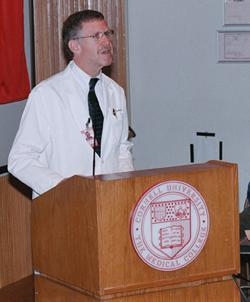At the Opening Day program held on Aug. 22, the new students heard welcoming remarks from Cornell University President Hunter Rawlings and Dr. Antonio Gotto, provost for Medical Affairs and dean of Weill Medical College.
The keynote address was presented by Dr. Alvin Mushlin, chairman of the Department of Public Health. Dr. Mushlin reviewed both the remarkable progress in medical science and practice that has occurred during the 30 years since he finished clinical training and the considerable challenges and opportunities in science, medical practice and public policy that await the new students in the years ahead after they have graduated from Weill Cornell.
Reviewing the progress of the last 30 years, Dr. Mushlin noted that the common epidemics of measles, mumps and chicken pox have been eradicated with the development of preventive vaccines. Mammography screening has dramatically reduced the death rate from breast cancer. The development of new imaging technologies like CAT scans and MRIs have largely eliminated the need for major exploratory surgery to make a diagnosis. With the discovery of the bacterial cause of duodenal ulcers, stomach ulcers that used to be commonly treated with surgery are now cured with antibiotics. The development of chemotherapeutic drugs has increased the survival rate for acute lymphocytic leukemia in children from only 5 percent to more than 80 percent. Within the last several years, new drugs and drug combinations have also increased the long-term survival rate for patients with AIDS from less than 50 percent at two years to nearly 90 percent at four years. The treatment of major mental illnesses has also been dramatically improved by the development of effective medications. The death rate of patients hospitalized with heart attacks has declined significantly, and the incidence of high cholesterol levels in the general population has also declined.

Dr. Alvin Mushlin, keynote speaker at Opening Day.
Througout their future careers, Dr. Mushlin noted, the new students will have many other challenges facing them and human society. There will be public policy and ethical issues related to the human genome project and the promise of embryonic stem cell research. Emerging diseases like the West Nile virus and ebola virus threaten to spread into new territories around the globe. More familiar diseases like tuberculosis, which has developed multi-drug-resistant strains, and childhood asthma are causing new problems. The costs of medical care, which now represent nearly 15 percent of the gross domestic product in the U.S., will continue to increase. New technologies tend to increase over-diagnosis and unnecessary treatment. Increasing numbers of Americans, now some 44 million people, still have no health insurance at all. Racial and ethnic disparities have been documented in types of treatment provided despite comparable health insurance coverage. Prevention efforts need to address the continuing fact that 70 percent of the determinants of health are related to health behaviors and the environment. Computers, the Internet, and the information explosion need to be organized and utilized in ways that will most improve human health.
"As you think about the variety of things that I have covered," said Dr. Mushlin, "remember that your education here is an opportunity not only to learn everything that we have to teach, but also to help you discover your own strengths and find out where you fit into this wonderfully diverse profession that we have, with this tremendous spectrum of opportunities."
Class of 2005
New Medical Students
Total Enrolled: 101
Men: 52
Women: 49
MD-PhD Students: 10 (7 men; 3 women)
Underrepresented Minorities: 25
N.Y. State Residents: 45
Out of State: 56
U.S. Citizens: 97
Permanent Residents: 4
Science Majors: 71
Non-Science: 30
Average Science GPA: 3.69
Average MCATs: Verbal 10.3, Physical Sciences 11, Biological Sciences 11.1
Age range: 20–36
Undergraduate Institutions: 54
Number of Applicants: 5,766
New Graduate Students
Total Enrolled: 56
Men: 23
Women: 33
Average GPA: 3.76
Average GRE Percentiles: Verbal (87th percentile), Quantative (90th percentile), Analytical (86th percentile)
N.Y. State Residents: 19
Out of State: 37
Underrepresented Minorities: 5
U.S. Citizens: 22
International Students: 34
Undergraduate Institutions: 53
Number of Applicants: 437
Programs Selected:
Pharmacology (13), Molecular Biology (11), Neuroscience (10), Cell Biology & Genetics (6), Physiology, Biophysics & Molecular Medicine (6), Biochemistry & Structrual Biology (5), Immunology (5)

